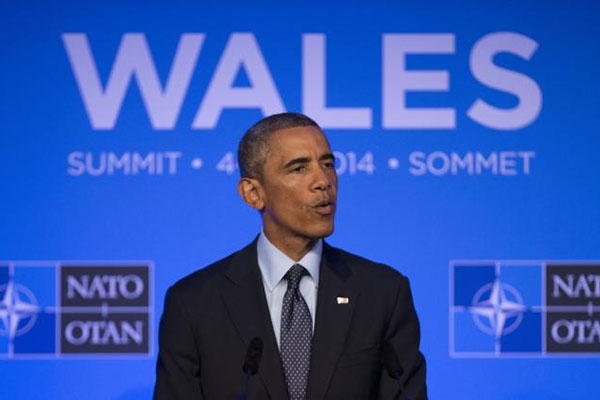President Obama and NATO leaders agreed Friday to form a Rapid Response Force of several thousand troops with headquarters in Eastern Europe to protect alliance member states against aggression.
The U.S. troop commitment to the developing plan put forward at the NATO summit in Wales was not immediately clear but Britain said it was ready to pledge 3,500 troops.
NATO Secretary General Anders Fogh Rasmussen said a multi-national "spearhead" force capable of deploying within 48 hours would shore up the 28-member alliance's commitment to NATO's Article 5, which pledges member states to come to the aid of any member that is attacked.
The new reaction force with a headquarters possibly in Poland sent the message to potential aggressors.
"Should you even think of attacking one ally, you will be facing the whole alliance," Rasmussen said.
Article 5 was invoked for the first and only time after the Sept. 11, 2001 Al Qaeda terror attacks on the U.S. Under Article 5, NATO troops were sent to Afghanistan in the International Security Assistance Force.
At his closing news conference in Wales, Obama did not say what the U.S. contribution would be to the Rapid Response Force and the accompanying Readiness Action Plan in terms of troops and equipment.
Obama said he previously had pledged $1 billion to bolster NATO readiness and added that "a sizeable portion of that will be devoted to implementing various aspects of this Readiness Action Plan."
Obama noted that the U.S. had already increased rotations of troops through the Baltic states, bolstered air patrols over the Baltics, and increased Navy patrols in the Black Sea.
About 600 troops from the 173rd Airborne Brigade, based in Vicenza, Italy, have been conducting joint exercises in Estonia, Lativa, Lithuania and Poland for the last three months. The 600 troops from the 173rd are due to be replaced next month by a similar number from the Army's First Cavalry Division.
The creation of the Rapid Response Force would allow the U.S. to supplement current troop rotations in Eastern Europe, Obama said.
"It allows us to coordinate it and integrate it further with additional contributions from other partners," Obama said.
Obama spoke after Ukrainian President Petro Poroshenko announced a cease fire aimed at ending nearly five months of clashes with Russian-backed separatists in eastern Ukraine.
"I count on this agreement, including the ceasing of fire and the freeing of hostages, to be precisely observed," Poroshenko said after peace talks in Minsk, the capital of Belarus, with representatives of the rebels, Russia and the Organzation for Security and Cooperation in Europe.
"The cease-fire will allow us to save not only civilians lives, but also the lives of the people who took up arms in order to defend their land and ideals," said Alexander Zakharchenko, the rebel leader from the Donetsk region, the Associated Press reported
In Wales, Obama said that "with respect to the cease-fire agreement, obviously we are hopeful, but based on past experience, also skeptical that in fact the separatists will follow through and the Russians will stop violating Ukraine's sovereignty and territorial integrity. So it has to be tested."
It was not immediately clear whether the U.S. and its European allies would now go ahead with tougher economic sanctions against Russia that had been under consideration.
"That's something that obviously we'll consult closely with our European partners to determine," Obama said.
Russia's Foreign Ministry warned in a statement that planned exercises in Ukraine starting next week by U.S. and international troops threatened the peace process.
About 200 troops from the 173rd Airborne Brigade were expected to join about 1,000 allied troops for the Rapid Trident training exercises from Sept. 15-26, according to the Pentagon.
The plans announced to hold joint NATO exercises with Kiev on the territory of that country before the end of 2014 will inevitably lead to heightened tension," the Russian Foreign Ministry said.
"They risk wrecking the progress made in the peace process in Ukraine, and encourage a deepening of the split in Ukrainian society," the Russian Foreign Ministry said in a statement.
-- Richard Sisk can be reached at richard.sisk@monster.com































